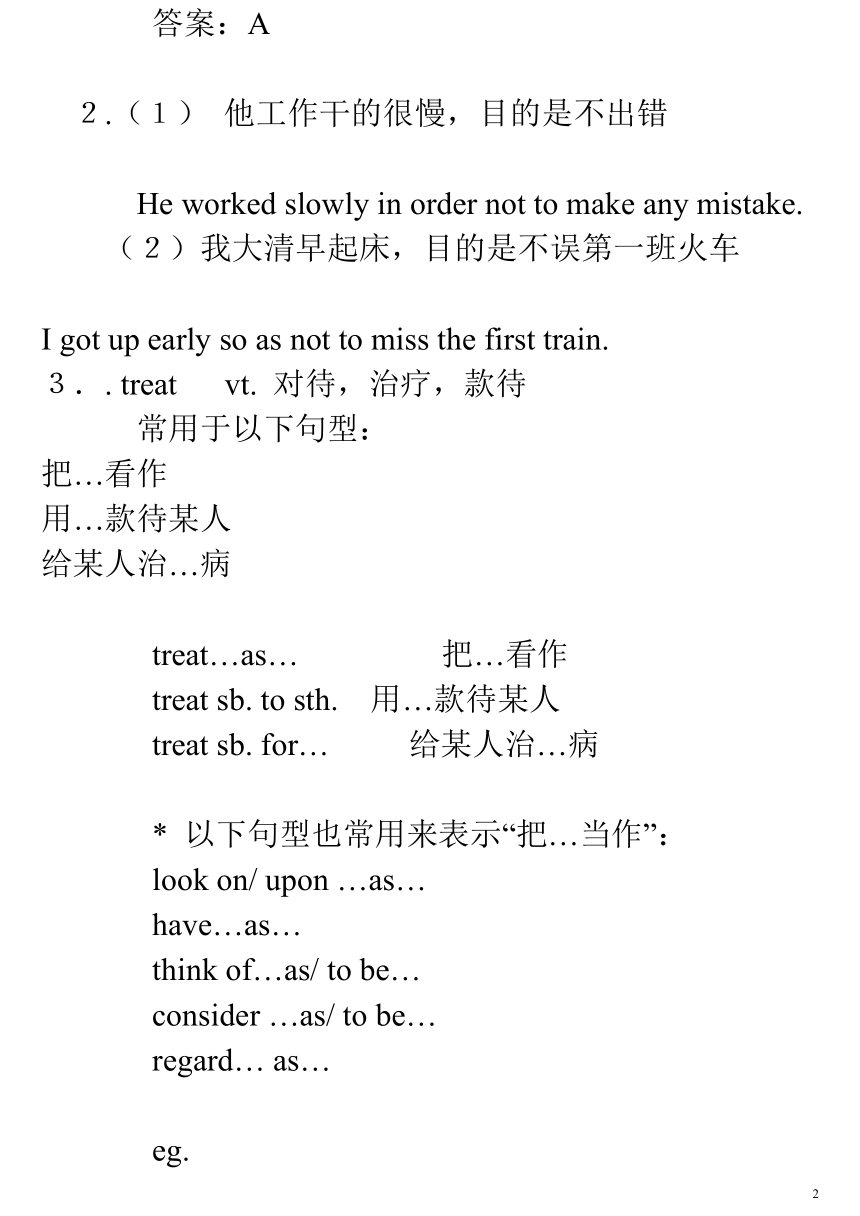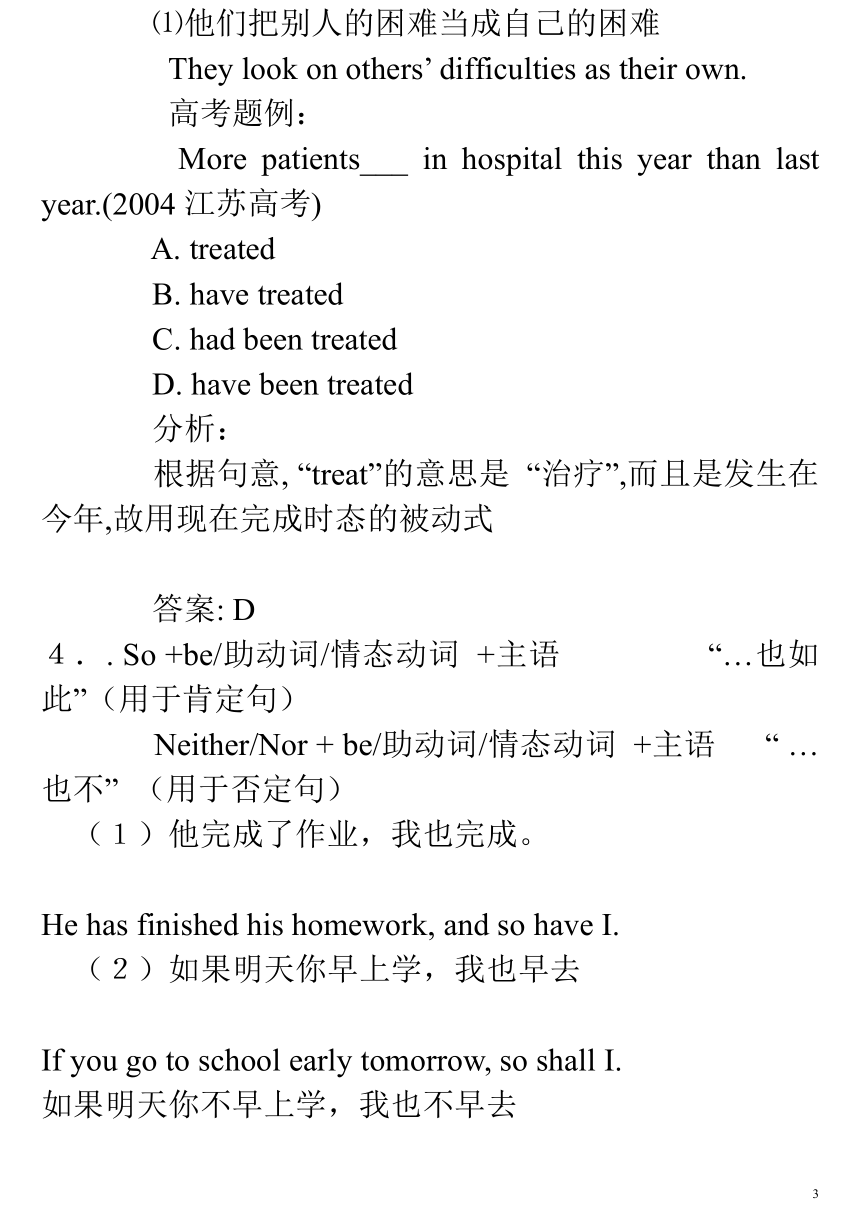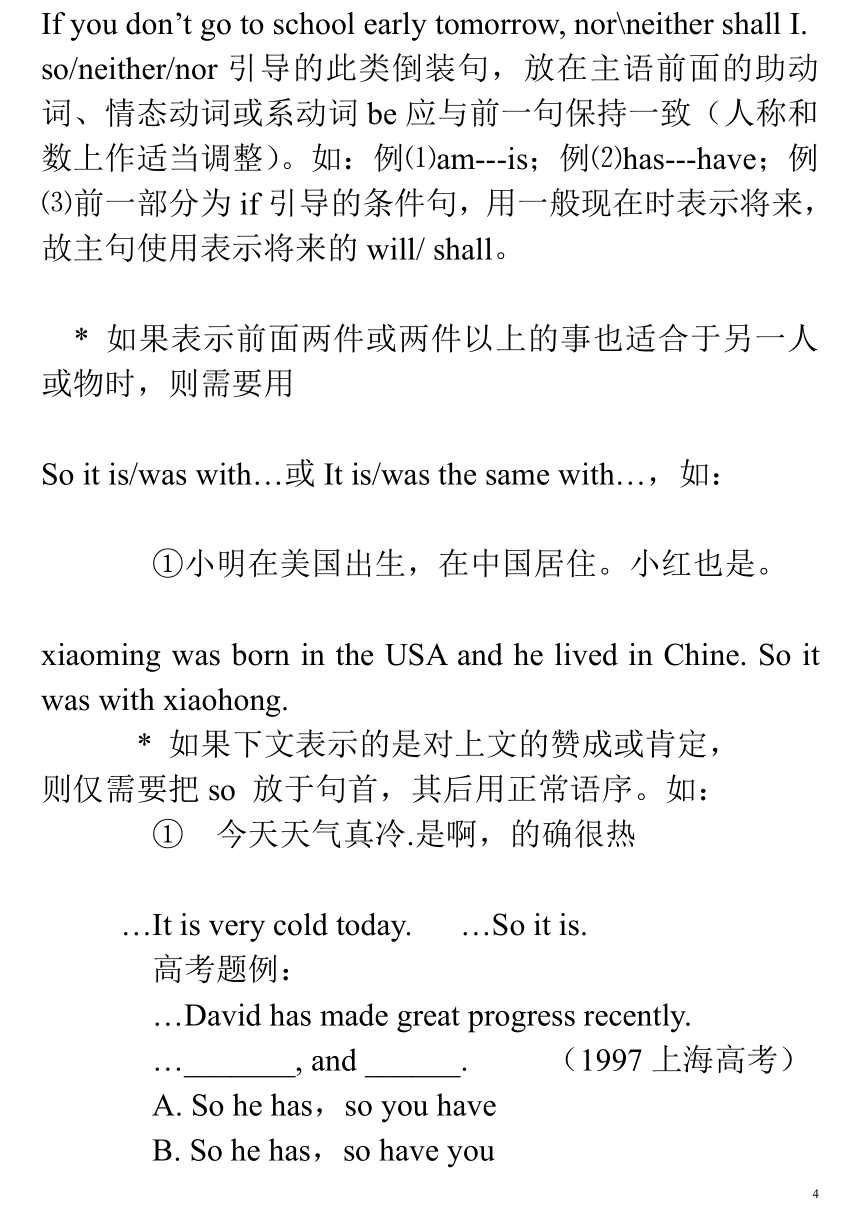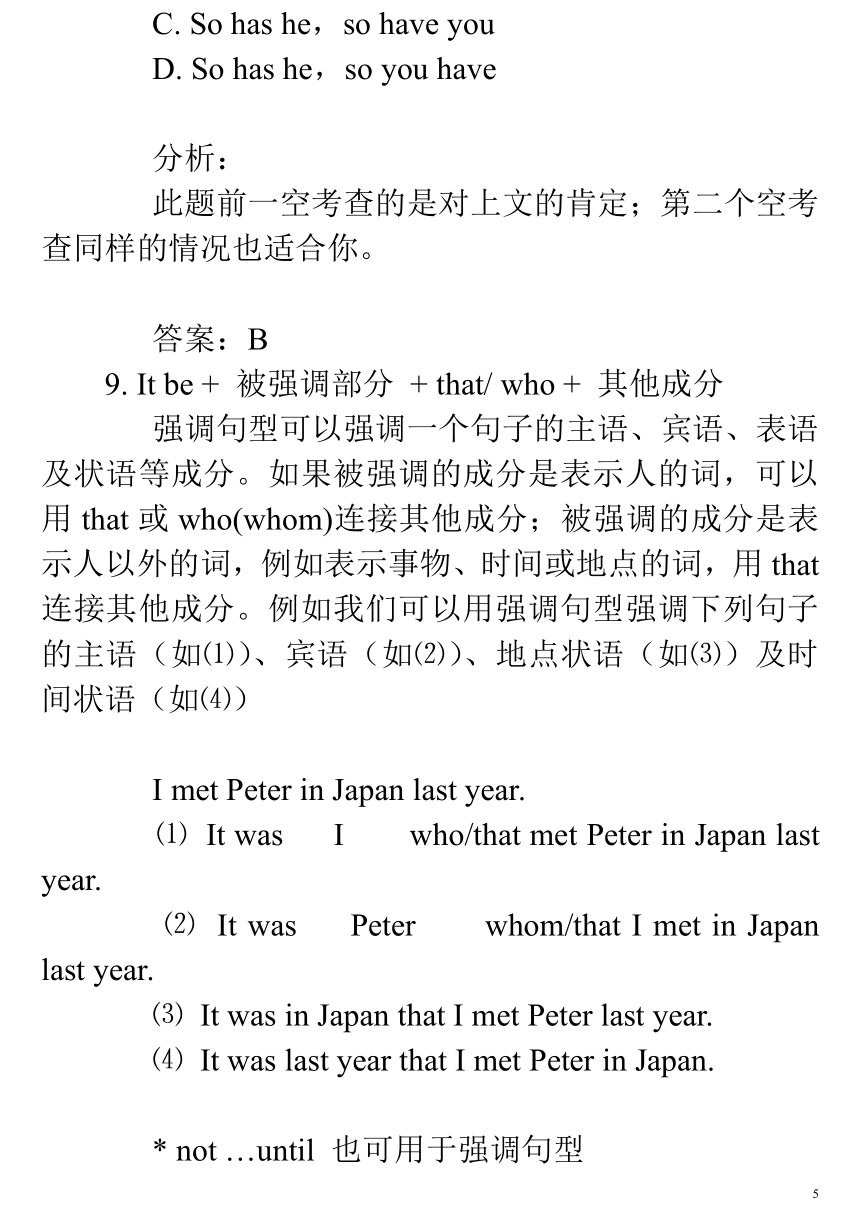第一册unit1-2单元复习[上学期]
图片预览





文档简介
看汉语写单词
1.诚实的 2.明智的 3.古典的 4.火柴 5.荒芜的 6.演讲 7.重复 8.多数 9.相等的 10.交流 11.信号 12.独立自主的 13.总统 14.欧洲的 15.短语
二.写出下面短语
1.一直 2.即使 3.上网冲浪 4.在某方面敏捷 5.别客气 6.熬夜
7.发生 8.了解、掌握 9.给某人写信 10.总共
三..知识点归纳:
1.too much 具有形容词、副词和代词的功能,在句中可作定语、表语、状语、主语或宾语,表示“太多(的)、过分(的)、好极(的)”意思
高考题例:
Allen had to call a taxi because the box was _____ to carry all the way home.(NMET2003)
A. much too heavy
B. too much heavy
C. heavy too much
D. too heavy much
分析:
heavy为形容词,故应用much too修饰
答案:A
2.(1) 他工作干的很慢,目的是不出错
He worked slowly in order not to make any mistake.
(2)我大清早起床,目的是不误第一班火车
I got up early so as not to miss the first train.
3.. treat vt. 对待,治疗,款待
常用于以下句型:
把…看作
用…款待某人
给某人治…病
treat…as… 把…看作
treat sb. to sth. 用…款待某人
treat sb. for… 给某人治…病
* 以下句型也常用来表示“把…当作”:
look on/ upon …as…
have…as…
think of…as/ to be…
consider …as/ to be…
regard… as…
eg.
⑴他们把别人的困难当成自己的困难
They look on others’ difficulties as their own.
高考题例:
More patients___ in hospital this year than last year.(2004江苏高考)
A. treated
B. have treated
C. had been treated
D. have been treated
分析:
根据句意, “treat”的意思是 “治疗”,而且是发生在今年,故用现在完成时态的被动式
答案: D
4.. So +be/助动词/情态动词 +主语 “…也如此”(用于肯定句)
Neither/Nor + be/助动词/情态动词 +主语 “ …也不” (用于否定句)
(1)他完成了作业,我也完成。
He has finished his homework, and so have I.
(2)如果明天你早上学,我也早去
If you go to school early tomorrow, so shall I.
如果明天你不早上学,我也不早去
If you don’t go to school early tomorrow, nor\neither shall I.
so/neither/nor引导的此类倒装句,放在主语前面的助动词、情态动词或系动词be应与前一句保持一致(人称和数上作适当调整)。如:例⑴am---is;例⑵has---have;例⑶前一部分为if引导的条件句,用一般现在时表示将来,故主句使用表示将来的will/ shall。
* 如果表示前面两件或两件以上的事也适合于另一人或物时,则需要用
So it is/was with…或It is/was the same with…,如:
①小明在美国出生,在中国居住。小红也是。
xiaoming was born in the USA and he lived in Chine. So it was with xiaohong.
* 如果下文表示的是对上文的赞成或肯定,
则仅需要把so 放于句首,其后用正常语序。如:
① 今天天气真冷.是啊,的确很热
…It is very cold today. …So it is.
高考题例:
…David has made great progress recently.
…_______, and ______. (1997上海高考)
A. So he has,so you have
B. So he has,so have you
C. So has he,so have you
D. So has he,so you have
分析:
此题前一空考查的是对上文的肯定;第二个空考查同样的情况也适合你。
答案:B
9. It be + 被强调部分 + that/ who + 其他成分
强调句型可以强调一个句子的主语、宾语、表语及状语等成分。如果被强调的成分是表示人的词,可以用that或who(whom)连接其他成分;被强调的成分是表示人以外的词,例如表示事物、时间或地点的词,用that连接其他成分。例如我们可以用强调句型强调下列句子的主语(如⑴)、宾语(如⑵)、地点状语(如⑶)及时间状语(如⑷)
I met Peter in Japan last year.
⑴ It was I who/that met Peter in Japan last year.
⑵ It was Peter whom/that I met in Japan last year.
⑶ It was in Japan that I met Peter last year.
⑷ It was last year that I met Peter in Japan.
* not …until 也可用于强调句型
雨到了半夜才停
The rain didn’t stop until midnight.
可变为:It was not until midnight that the rain stopped.
我们来比较下面的句子:
It was in the evening that the soldiers arrived at the small mountain village.
It was evening when the soldiers arrived at the small mountain village.
It was 3 o’clock when they came back.
It is for three hours that they have been back. It was three hours before they came back.
It is three hours since they came back.
It was raining when they came back.
It is true that he once went to <>.
It is a surprise that Mary should have won the first prize.
巩固练习:
1.It is these poisonous products__________can cause the symptoms of the flu, such as headache and aching muscles. (2003 )
A. who B. that C. how D. what
2.I feel it is your husband who__________for the spoiled child.
A. is to blame B. is going to blame
C. is to be blamed D. should blame
3.It was for this reason__________her uncle moved out of <> and settled down in a small village. (2001 )
A. which B. why
C. that D. how
4.—Where was it__________the road accident happened yesterday
—In front of the market.
A. when B. that C. which D. how
5.It was not until she had arrived home__________her appointment with the doctor.
A. did she remember
B. that she remembered
C. when she remembered
D. had she remembered
6.It was not until 1956__________liberated.
A. that the town was
B. did the town
C. was the town
D. that was the town
参考答案:1—6 BACBBA
10. have difficulty (in) doing sth. 做某事有困难
⑵解决这个问题,他有一点困难
He had a little difficulty in solving the problem.
12. except:
高考题例:
I know nothing about the young lady ________ she is from Beijing. (2000上海高考)
A. except
B. except for
C. except that
D.besides
分析:
except for与except that同义,但except for后不能接句子,后句“she is from Beijing”是一个完整的陈述句,故用except that连接,that不作成分。
答案:C
*besides: (prep.) “除…之外还有”,常与also, else, other等词连用。如: 13. with的复合结构 :常在句中作状语,表示伴随动作、行为方式及原因、条件或结果等情况。
with + 宾语 +prep./adj./ adv./ doing/ to do(表示要执行的动作)/done(表示动作的完成及被动)
高考题例1:
With a lot of difficult problems _____, the newly-elected president is having a hard time.(2002上海高考)
A. settled
B. settling
C. to settle
D. being settled
分析:
因后句的进行时表示将来,“新当选的总统将要度过一段艰难的时光”,故用“with+宾语+不定式”表示将来要执行的动作。
答案:C
高考题例2:
_____two exams to worry about, I have to work really hard this weekend.(2004北京高考)
A. With
B. Besides
C. As for
D. Because of
分析:
根据句意,此处应采用“with +宾语+不定式”
答案:A
15.了解,懂得,掌握
不知道,不了解
据…所知
在…不知道的情况下
被某人知悉
have a good knowledge of …了解,懂得,掌握
have no knowledge of…不知道,不了解
to one’s knowledge 据…所知
without the knowledge of在…不知道的情况下
come to sb’s knowledge 被某人知悉
高考题例:
One way to understand thousands of new words is to gain ____ good knowledge of basic word formation. (2002上海高考)
A. /
B. the
C. a
D. one
分析:
knowledge为不可数名词,但若有形容词修饰,则加不定冠词a
答案:C
16. consider 高考链接
Charles Babbage is generally considered ______ the first computer. (NMET 1993)
A. to invent
B. inventing
C. to have invented
D. having invented
答案:C
分析:
该句为 consider sb. to do 的被动结构,即 be considered to do, 同时要注意不定式的时态。因为“发明电脑”发生在“认为”之前,故不定式用完成时。
17 用,依靠
一定,务必,当然
决不,并未
by means of 用,依靠
by all means 一定,务必,当然
by no means 决不,并未
19. protect 保护---使不受,防御
protect---from/against---
21. 当心,注意,常与for连用
watch out
watch out for sb./ sth. (to do)
如果不注意讲话中的习惯表达方式,你就学不好英 语。
You can’t learn English well without watching out for idiomatic ways of saying things.
b)Watch it! = Watch out!
照看,看守
watch over
同步练习:
一、单项选择
1. ---I hear Bill likes playing basketball.
---Yes, ________, and _______.
A. he does;so like me
B. he is;either do I
C. so he does;so do I
D. he does so;so am I
(c)
2. These math problems are _______ difficult for me. Could you please help me out
A. much too
B. too much
C. very much
D. such
(a)
3. ---Do you know which team won the game
---I don’t know, ______.
A. nor do I care
B. nor I care
C. neither will I care
D. I don’t care, too
(a)
4. Although the little girl was ______ at home, she didn’t feel _____ at all.
A. alone, lonely
B. lonely, alone
C. alone, alone
D. lonely, lonely
(a)
5. One day Chuck is ______ a flight _____ the Pacific Ocean ______ suddenly his plane crashes.
A. in, over, while
B. on, across, when
C. with, through, when
D. on , across, while
(b)
6. Was ______ in this place that he saved the boy
A. that
B. it
C. he
D. this
(b)
7. Helen and Linda were introduced to each other _______ at a party.
A. for the first time
B. the first time
C. all the time
D. for some time
(a)
8. What was it ______ you found in the hole
A. that
B. which
C. and
D. this
(a)
9. Make yourself ______ home and help yourself ______ anything that you’d like to eat.
A. in, with
B. at , to
C. at, with
D. in, to
(b)
10. The _______ of students are against your plan.
A. most
B. many
C. number
D. majority
(d)
11. A great ______ of foreign guests come to out school for a visit every year.
A. deal
B. number
C. plenty
D. lot
(b)
12. The house is beautifully built ______ its chimney.
A. except
B. except for
C. besides
D. except that
(b)
13. He ran out with his face ______ in hands.
A. bury
B. burying
C. buried
D. to bury
(c)
14. Many people agree that ______ knowledge of English is a must in _______ international trade today.
A. a, /
B. the, an
C. the, the
D. /, the
(a)
15. All possible means ______ been tried.
A. is
B. are
C. has
D. have
(d)
PAGE
16
1.诚实的 2.明智的 3.古典的 4.火柴 5.荒芜的 6.演讲 7.重复 8.多数 9.相等的 10.交流 11.信号 12.独立自主的 13.总统 14.欧洲的 15.短语
二.写出下面短语
1.一直 2.即使 3.上网冲浪 4.在某方面敏捷 5.别客气 6.熬夜
7.发生 8.了解、掌握 9.给某人写信 10.总共
三..知识点归纳:
1.too much 具有形容词、副词和代词的功能,在句中可作定语、表语、状语、主语或宾语,表示“太多(的)、过分(的)、好极(的)”意思
高考题例:
Allen had to call a taxi because the box was _____ to carry all the way home.(NMET2003)
A. much too heavy
B. too much heavy
C. heavy too much
D. too heavy much
分析:
heavy为形容词,故应用much too修饰
答案:A
2.(1) 他工作干的很慢,目的是不出错
He worked slowly in order not to make any mistake.
(2)我大清早起床,目的是不误第一班火车
I got up early so as not to miss the first train.
3.. treat vt. 对待,治疗,款待
常用于以下句型:
把…看作
用…款待某人
给某人治…病
treat…as… 把…看作
treat sb. to sth. 用…款待某人
treat sb. for… 给某人治…病
* 以下句型也常用来表示“把…当作”:
look on/ upon …as…
have…as…
think of…as/ to be…
consider …as/ to be…
regard… as…
eg.
⑴他们把别人的困难当成自己的困难
They look on others’ difficulties as their own.
高考题例:
More patients___ in hospital this year than last year.(2004江苏高考)
A. treated
B. have treated
C. had been treated
D. have been treated
分析:
根据句意, “treat”的意思是 “治疗”,而且是发生在今年,故用现在完成时态的被动式
答案: D
4.. So +be/助动词/情态动词 +主语 “…也如此”(用于肯定句)
Neither/Nor + be/助动词/情态动词 +主语 “ …也不” (用于否定句)
(1)他完成了作业,我也完成。
He has finished his homework, and so have I.
(2)如果明天你早上学,我也早去
If you go to school early tomorrow, so shall I.
如果明天你不早上学,我也不早去
If you don’t go to school early tomorrow, nor\neither shall I.
so/neither/nor引导的此类倒装句,放在主语前面的助动词、情态动词或系动词be应与前一句保持一致(人称和数上作适当调整)。如:例⑴am---is;例⑵has---have;例⑶前一部分为if引导的条件句,用一般现在时表示将来,故主句使用表示将来的will/ shall。
* 如果表示前面两件或两件以上的事也适合于另一人或物时,则需要用
So it is/was with…或It is/was the same with…,如:
①小明在美国出生,在中国居住。小红也是。
xiaoming was born in the USA and he lived in Chine. So it was with xiaohong.
* 如果下文表示的是对上文的赞成或肯定,
则仅需要把so 放于句首,其后用正常语序。如:
① 今天天气真冷.是啊,的确很热
…It is very cold today. …So it is.
高考题例:
…David has made great progress recently.
…_______, and ______. (1997上海高考)
A. So he has,so you have
B. So he has,so have you
C. So has he,so have you
D. So has he,so you have
分析:
此题前一空考查的是对上文的肯定;第二个空考查同样的情况也适合你。
答案:B
9. It be + 被强调部分 + that/ who + 其他成分
强调句型可以强调一个句子的主语、宾语、表语及状语等成分。如果被强调的成分是表示人的词,可以用that或who(whom)连接其他成分;被强调的成分是表示人以外的词,例如表示事物、时间或地点的词,用that连接其他成分。例如我们可以用强调句型强调下列句子的主语(如⑴)、宾语(如⑵)、地点状语(如⑶)及时间状语(如⑷)
I met Peter in Japan last year.
⑴ It was I who/that met Peter in Japan last year.
⑵ It was Peter whom/that I met in Japan last year.
⑶ It was in Japan that I met Peter last year.
⑷ It was last year that I met Peter in Japan.
* not …until 也可用于强调句型
雨到了半夜才停
The rain didn’t stop until midnight.
可变为:It was not until midnight that the rain stopped.
我们来比较下面的句子:
It was in the evening that the soldiers arrived at the small mountain village.
It was evening when the soldiers arrived at the small mountain village.
It was 3 o’clock when they came back.
It is for three hours that they have been back. It was three hours before they came back.
It is three hours since they came back.
It was raining when they came back.
It is true that he once went to <
It is a surprise that Mary should have won the first prize.
巩固练习:
1.It is these poisonous products__________can cause the symptoms of the flu, such as headache and aching muscles. (2003 )
A. who B. that C. how D. what
2.I feel it is your husband who__________for the spoiled child.
A. is to blame B. is going to blame
C. is to be blamed D. should blame
3.It was for this reason__________her uncle moved out of <
A. which B. why
C. that D. how
4.—Where was it__________the road accident happened yesterday
—In front of the market.
A. when B. that C. which D. how
5.It was not until she had arrived home__________her appointment with the doctor.
A. did she remember
B. that she remembered
C. when she remembered
D. had she remembered
6.It was not until 1956__________liberated.
A. that the town was
B. did the town
C. was the town
D. that was the town
参考答案:1—6 BACBBA
10. have difficulty (in) doing sth. 做某事有困难
⑵解决这个问题,他有一点困难
He had a little difficulty in solving the problem.
12. except:
高考题例:
I know nothing about the young lady ________ she is from Beijing. (2000上海高考)
A. except
B. except for
C. except that
D.besides
分析:
except for与except that同义,但except for后不能接句子,后句“she is from Beijing”是一个完整的陈述句,故用except that连接,that不作成分。
答案:C
*besides: (prep.) “除…之外还有”,常与also, else, other等词连用。如: 13. with的复合结构 :常在句中作状语,表示伴随动作、行为方式及原因、条件或结果等情况。
with + 宾语 +prep./adj./ adv./ doing/ to do(表示要执行的动作)/done(表示动作的完成及被动)
高考题例1:
With a lot of difficult problems _____, the newly-elected president is having a hard time.(2002上海高考)
A. settled
B. settling
C. to settle
D. being settled
分析:
因后句的进行时表示将来,“新当选的总统将要度过一段艰难的时光”,故用“with+宾语+不定式”表示将来要执行的动作。
答案:C
高考题例2:
_____two exams to worry about, I have to work really hard this weekend.(2004北京高考)
A. With
B. Besides
C. As for
D. Because of
分析:
根据句意,此处应采用“with +宾语+不定式”
答案:A
15.了解,懂得,掌握
不知道,不了解
据…所知
在…不知道的情况下
被某人知悉
have a good knowledge of …了解,懂得,掌握
have no knowledge of…不知道,不了解
to one’s knowledge 据…所知
without the knowledge of在…不知道的情况下
come to sb’s knowledge 被某人知悉
高考题例:
One way to understand thousands of new words is to gain ____ good knowledge of basic word formation. (2002上海高考)
A. /
B. the
C. a
D. one
分析:
knowledge为不可数名词,但若有形容词修饰,则加不定冠词a
答案:C
16. consider 高考链接
Charles Babbage is generally considered ______ the first computer. (NMET 1993)
A. to invent
B. inventing
C. to have invented
D. having invented
答案:C
分析:
该句为 consider sb. to do 的被动结构,即 be considered to do, 同时要注意不定式的时态。因为“发明电脑”发生在“认为”之前,故不定式用完成时。
17 用,依靠
一定,务必,当然
决不,并未
by means of 用,依靠
by all means 一定,务必,当然
by no means 决不,并未
19. protect 保护---使不受,防御
protect---from/against---
21. 当心,注意,常与for连用
watch out
watch out for sb./ sth. (to do)
如果不注意讲话中的习惯表达方式,你就学不好英 语。
You can’t learn English well without watching out for idiomatic ways of saying things.
b)Watch it! = Watch out!
照看,看守
watch over
同步练习:
一、单项选择
1. ---I hear Bill likes playing basketball.
---Yes, ________, and _______.
A. he does;so like me
B. he is;either do I
C. so he does;so do I
D. he does so;so am I
(c)
2. These math problems are _______ difficult for me. Could you please help me out
A. much too
B. too much
C. very much
D. such
(a)
3. ---Do you know which team won the game
---I don’t know, ______.
A. nor do I care
B. nor I care
C. neither will I care
D. I don’t care, too
(a)
4. Although the little girl was ______ at home, she didn’t feel _____ at all.
A. alone, lonely
B. lonely, alone
C. alone, alone
D. lonely, lonely
(a)
5. One day Chuck is ______ a flight _____ the Pacific Ocean ______ suddenly his plane crashes.
A. in, over, while
B. on, across, when
C. with, through, when
D. on , across, while
(b)
6. Was ______ in this place that he saved the boy
A. that
B. it
C. he
D. this
(b)
7. Helen and Linda were introduced to each other _______ at a party.
A. for the first time
B. the first time
C. all the time
D. for some time
(a)
8. What was it ______ you found in the hole
A. that
B. which
C. and
D. this
(a)
9. Make yourself ______ home and help yourself ______ anything that you’d like to eat.
A. in, with
B. at , to
C. at, with
D. in, to
(b)
10. The _______ of students are against your plan.
A. most
B. many
C. number
D. majority
(d)
11. A great ______ of foreign guests come to out school for a visit every year.
A. deal
B. number
C. plenty
D. lot
(b)
12. The house is beautifully built ______ its chimney.
A. except
B. except for
C. besides
D. except that
(b)
13. He ran out with his face ______ in hands.
A. bury
B. burying
C. buried
D. to bury
(c)
14. Many people agree that ______ knowledge of English is a must in _______ international trade today.
A. a, /
B. the, an
C. the, the
D. /, the
(a)
15. All possible means ______ been tried.
A. is
B. are
C. has
D. have
(d)
PAGE
16
